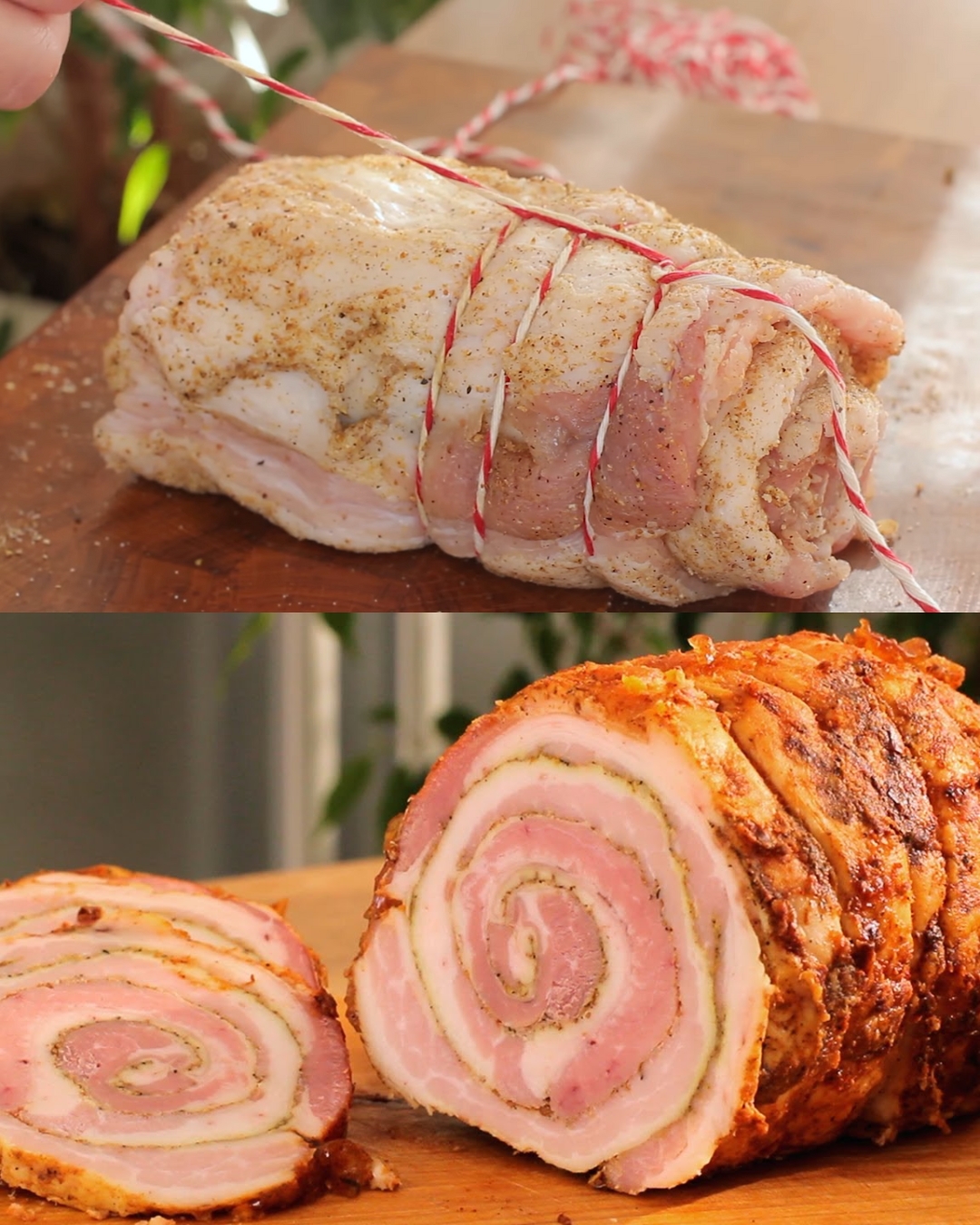Crafting your own ham at home may sound daunting, but with simple ingredients and a little patience, you’ll end up with a show‑stopping centerpiece far superior to store‑bought varieties. This recipe transforms an affordable beef brisket into a beautifully rolled ham, seasoned with black pepper, coriander, garlic, and traditional Georgian khmeli‑suneli. Nitrite salt ensures a safe cure and authentic pink hue, while a final rub of smoked paprika, paprika flakes, and barbecue sauce adds a glossy, flavorful crust. The low‑and‑slow cooking method—4 hours at just above boiling point—breaks down connective tissue for meltingly tender meat. Once rested, slices are dense yet tender, perfect for sandwiches, charcuterie boards, or holiday plates.
Beyond taste, this homemade ham lets you control sodium, spice level, and additives, delivering a wholesome, artisan result. Whether you’re hosting a festive gathering or simply want elevated weekday lunches, this rolled brisket ham is versatile, crowd‑pleasing, and endlessly customizable.
Preparation, Cook, and Total Times
-
Preparation Time: 45 minutes (plus 36‑hour cure)
-
Cook Time: 4 hours
-
Resting Time: Overnight chill (at least 12 hours)
-
Total Time: Approximately 41 hours
Yield
Serves 8–10 generously, depending on slice thickness.
Cuisine
Fusion of Eastern European charcuterie with modern home‑cook technique.
Full List of Ingredients
-
1 kg (2.2 lbs) beef brisket, trimmed and cut into a single sheet
-
17 g (0.6% by weight) pink curing salt (nitrite salt)
-
½ tsp ground black pepper
-
1 tsp ground coriander
-
1 tsp dried garlic powder
-
1 tsp khmeli‑suneli (or substitute with curry powder)
-
1 tsp paprika flakes
-
1 tsp smoked paprika
-
1 Tbsp barbecue sauce (or ketchup)
-
Plastic wrap and kitchen twine for rolling and tying
Step‑by‑Step Cooking Directions
-
Prepare the Spice Rub: In a small bowl, whisk together nitrite salt, black pepper, coriander, garlic powder, and khmeli‑suneli until evenly combined.
-
Slice the Brisket: If the brisket is too thick, freeze for 30–60 minutes until firm. Lay it flat on plastic wrap, remove any excess fat, and slice horizontally into a long, even sheet about ½–1 cm thick.
-
Tenderize Meat: Cover the flattened brisket with plastic wrap and gently pound with a meat mallet, focusing on any thick or connected areas, to create a uniform thickness.
-
Season: Remove one layer of plastic. Evenly sprinkle half the spice blend over the meat’s surface, rubbing it in. Flip the brisket and repeat with the remaining spices. Ensure every inch is coated.
-
Roll Tightly: Starting at one short end, roll the brisket into a tight cylinder, keeping edges aligned.
-
Tie the Ham: Cut three‑ to four‑meter lengths of cooking twine. Loop around the roll every 2–3 cm, tying snugly to create even sections, which help maintain shape and ensure even cooking.
-
Wrap in Plastic: Lay two overlapping sheets of plastic wrap. Place the tied roll in the center and wrap tightly, twisting ends to seal. Chill in refrigerator for 36 hours for curing.
-
Preheat Oven & Prep Glaze: Preheat oven to 100 °C (212 °F). Meanwhile, whisk together paprika flakes, smoked paprika, and barbecue sauce in a small bowl.
-
Unwrap & Glaze: Remove roll from fridge. Unwrap plastic and pat dry. Rub glaze mixture evenly over all sides using gloves to avoid staining your hands.
-
Slow‑Cook with Thermometer: Place ham seam‑side down on parchment‑lined baking dish. Insert a probe thermometer into center. Roast at 100 °C until internal temperature reaches 72–74 °C (165 °F), about 4 hours.
-
Rest & Chill: Remove from oven and let rest 10 minutes. Wrap in baking paper, then aluminum foil. Let cool to room temperature, then refrigerate overnight to firm up for clean slicing.
-
Serve: Unwrap, cut twine, and slice as thinly as possible against the grain for the best texture.
Nutritional Information
Per 100 g serving (approximate):
-
Calories: 250 kcal
-
Protein: 26 g
-
Fat: 15 g
-
Saturated Fat: 6 g
-
Carbohydrates: 3 g
-
Sodium: 850 mg
-
Sugar: 1 g
Origins and Popularity of the Recipe
Curing meat with salt and spices dates back millennia, from Roman garum to Chinese lap yuk. Rolled, cured, and slow‑cooked hams are staples in Europe—prosciutto in Italy, Black Forest ham in Germany, and Jinhua ham in China. This beef‑based ham draws inspiration from Georgian khmeli‑suneli spice blends, merging Eastern European charcuterie with Middle Eastern flavors. The brisket cut, popularized in North American barbecue, provides an affordable yet richly flavored alternative to traditional pork hams. Today, DIY charcuterie has surged on social media, with home cooks seeking control over ingredients and artisanal quality.
Reasons Why You’ll Love the Recipe
-
Superior Flavor Control: Tailor spices, smoke level, and glaze to your preference.
-
Cost‑Effective: Brisket is often cheaper per pound than deli ham.
-
Impressive Presentation: Tight slices reveal concentric spirals of spice.
-
Versatility: Serve warm or cold, in sandwiches, salads, or as a party spread.
-
Long Shelf Life: Properly cured and stored, it keeps 5–7 days in fridge.
-
Fun DIY Project: Curing and rolling is a rewarding, hands‑on process.
Health Benefits
While cured meats often get a bad rap, this homemade version uses lean brisket and high‑quality curing salt. Brisket provides iron, zinc, and B vitamins critical for energy and immunity. Controlling sodium levels and avoiding nitrates from processed deli meats reduces potential health risks. The slow‑cooking method breaks down collagen into gelatin, aiding joint health and digestion. By making it at home, you eliminate preservatives and additives found in commercial hams.
Serving Suggestions
-
Classic Sandwiches: Layer thin slices on crusty rolls with grainy mustard and pickles.
-
Charcuterie Board: Pair with olives, aged cheeses, nuts, and honeycomb.
-
Salads: Cube and toss into potato or green salads for smoky richness.
-
Breakfast: Fold into omelets or quiches.
-
Tacos & Wraps: Use as filling with slaw and spicy mayo.
Common Mistakes to Avoid
-
Uneven Slicing: Thick spots lead to inconsistent curing—freeze to firm up before slicing.
-
Loose Tying: A loosely tied roll will expand and lose shape—tie snugly and frequently.
-
Skipping Rest: Cutting too soon yields crumbling—chill overnight for a tight texture.
-
High Oven Temp: Cooking above 100 °C dries out meat—maintain a low, steady temperature.
-
Insufficient Curing: Less than 36 hours yield a pale ham—allow full cure for color and safety.
Pairing Recommendations
-
Wine: Light reds like Pinot Noir or medium‑bodied Rosé.
-
Beer: Crisp pilsners or amber ales cut richness.
-
Spirits: Bourbon or rye whiskey complements smoky notes.
-
Non‑Alcoholic: Sparkling apple cider or ginger ale for a refreshing contrast.
Cooking Tips
-
Chill for Ease: Partially freeze brisket before flattening for cleaner cuts.
-
Uniform Thickness: Use a ruler or visual guide when pounding meat.
-
Thermometer Use: A reliable probe ensures safe internal temperature.
-
Spice Customization: Add chili flakes for heat or fennel pollen for sweetness.
-
Foil Shield: If outer crust darkens too fast, loosely cover with foil mid‑cook.
Variations to Try
-
Herb‑Infused: Replace khmeli‑suneli with fresh rosemary, thyme, and sage.
-
Sweet & Spicy: Add brown sugar and cayenne to the spice rub.
-
Smoked Finish: After roasting, cold‑smoke for 1–2 hours for true barbecue flavor.
-
Maple Glaze: Swap barbecue sauce for pure maple syrup and Dijon mustard.
-
Pork Brisket Ham: Try pork shoulder or belly instead of beef for classic ham taste.
Similar Recipes to Try
-
Homemade Bacon (Smoked or Maple‑Cured)
-
DIY Porchetta (Herb‑Filled Rolled Pork)
-
Cured Beef Bresaola
-
Salt‑Crusted Whole Roast Chicken
-
Beef Pastrami on Rye
Ingredient Spotlight
Khmeli‑Suneli: A traditional Georgian spice blend of dried marigold petals, coriander, fenugreek, dill, savory, bay leaf, and black pepper. It imparts warm, slightly bitter, and aromatic notes that elevate cured meats. Easily found online or substitute with equal parts coriander, fenugreek, and dried dill.
Advertisement
Conclusion
Transforming a humble beef brisket into a rolled, cured, and slow‑cooked ham is a gratifying culinary adventure. This recipe marries time‑honored curing techniques with modern home‑cook convenience. With a perfectly balanced spice profile, tender texture, and beautiful presentation, your homemade ham will become a go‑to for gatherings, sandwiches, and celebratory feasts. Embrace the process, customize the flavors, and savor the pride of serving artisan‑quality charcuterie crafted entirely by you.
Frequently Asked Questions
-
Can I use pork instead of beef brisket?
Yes—pork shoulder or pork belly works beautifully. Adjust curing time based on thickness and fat content. -
What if I don’t have nitrite curing salt?
You can omit it and use kosher salt only, but the ham will be grayish rather than pink and should be consumed sooner. -
How long can I store the finished ham?
Properly wrapped, it keeps up to 7 days in the refrigerator. Slice only what you need to maintain freshness. -
Can I freeze this ham?
Yes—slice and freeze in airtight bags for up to 2 months. Thaw overnight in fridge before serving. -
Is it safe to eat undercooked ham?
Always cook to an internal temperature of 72 °C (165 °F) for safety. Low‑temperature finishes require accurate thermometry. -
How do I prevent the roll from unravelling during cook?
Ensure the twine is tied snugly and frequently along the length. The plastic wrap cure firms it, and the cooking twine holds shape. -
Can I inject the spices instead of rubbing?
You may brine-inject for faster flavor penetration, but traditional rub and cure yield better texture and color. -
Why did my ham turn out dry?
Likely oven temperature too high or overcooked. Maintain 100 °C and remove at proper internal temp. -
How thin should I slice it?
Aim for 1–2 mm for delicate, foldable slices. A sharp slicer or offset knife helps. -
Can I add smoke flavor during cooking?
Yes—use a smoke box or handheld smoker to cold‑smoke after roasting, but keep smoke duration brief to avoid overpowering.
Cook with pleasure, and enjoy the satisfaction of serving your very own homemade rolled brisket ham!

